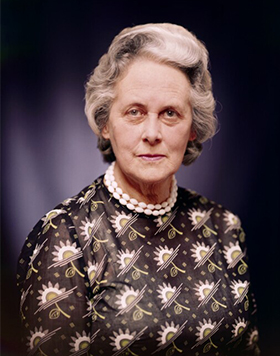Diana Reader Harris facts for kids
Dame Muriel Diana Reader Harris (born October 11, 1912, in Hong Kong – died October 7, 1996, in Salisbury, Wiltshire) was an important English educator and school leader. She was also a public figure who strongly believed that women should be allowed to become priests in the Church of England. She was honored as a Dame, which is a special title given for great achievements.
Contents
Early Life and Education
Muriel Diana was born in Hong Kong. When she was just two years old, she moved back to England. Sadly, her mother passed away soon after. Her father stayed in the Far East, so Muriel was raised by her aunt in London. She went to Francis Holland School and then Sherborne School for Girls. In 1934, she earned a top degree in English from the University of London.
A Dedicated Teacher and Headmistress
After finishing her studies, Muriel Diana Reader Harris immediately started teaching at Sherborne School for Girls. This was one of England's leading boarding schools for girls.
Wartime Experiences
During World War II, she traveled with a group of students from Sherborne to Branksome Hall School in Toronto, Canada. This trip helped create a lasting friendship between the two schools, which continued for many years. She returned to England in 1943 to work with the National Association of Girls' Clubs.
Leading Sherborne Girls
In 1950, Reader Harris returned to Sherborne School for Girls as its headmistress. She became very well-known and respected in her profession. She stayed at Sherborne until she retired in 1975. People who were students during her time remember that she created an atmosphere where everyone felt valued. She believed that every student had something important to offer and a duty to help their community.
Involvement in Public Life
While leading Sherborne, Reader Harris was also very active in many other organizations.
Supporting Education and Youth
In 1964, she became the head of the Association of Headmistresses. She helped guide the association's response to an important report about education called the Plowden Report. She also served on the Dorset Education Committee and was part of the councils for the National Youth Orchestra and the Outward Bound Trust.
Advocating for Change
Reader Harris was a strong member of the Church of England. She strongly supported the idea of allowing women to become priests. She often preached sermons in churches herself. After retiring in 1983, she became a lay canon in Salisbury, which is an honorary position in the church.
She was also the first woman president of the Church Missionary Society. Here, she helped the organization support the 1980 Brandt Report. This report was about helping to close the gap between richer and poorer countries around the world. She also chaired Christian Aid, a charity that helps people in need, from 1978 to 1983.
Other Important Roles
In 1975, she joined the council of the Royal Society of Arts, an organization that promotes arts, manufactures, and commerce. She chaired it from 1979 to 1981. She also served as a governor for Godolphin School in Salisbury from 1975 to 1986.
Reader Harris was a popular speaker and often broadcast on radio or television. Her personal diaries, which she kept throughout her life, are now stored in the archives at Sherborne Girls school.
Honours and Recognition
In 1972, Muriel Diana Reader Harris was given a very special award. She was made a Dame Commander of the Order of the British Empire. This honor was given to her for her great "services to Education and the Church."


